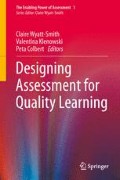Abstract
In this chapter we use an empirical investigation of the changes in assessment beliefs of preservice teachers to inform a discussion of what it might take to build a professional workforce to implement assessment to promote student learning. The findings demonstrated that significant changes in preservice teachers’ beliefs (as well as their knowledge and skills) are necessary if they are to become ‘assessment capable’ and ready to use assessment in the service of learning as teachers. We argue that mobilizing the power of assessment to enable learning, even in supportive policy contexts, is dependent upon teachers’ beliefs. Knowing about preservice teachers’ beliefs and how they change in relation to their teacher preparation programs is a first step in this process.
Access this chapter
Tax calculation will be finalised at checkout
Purchases are for personal use only
References
Absolum, M., Flockton, L., Hattie, J., Hipkins, R., & Reid, I. (2009). Directions for Assessment in New Zealand (DANZ). Wellington: New Zealand Ministry of Education.
Brown, G. T. L. (2004). Teachers’ conceptions of assessment: Implications for policy and professional development. Assessment in Education, 11, 301–318. doi:10.1080/0969594042000304609.
Brown, G. T. L. (2011). New Zealand prospective teacher conceptions of assessment and academic performance: Neither student nor practicing teacher. In R. Kahn, J. C. McDermott, & A. Akimjak (Eds.), Democratic access to education (pp. 119–132). Los Angeles: Antioch University Los Angeles, Department of Education.
Brown, G. T. L., & Hirschfeld, G. H. F. (2008). Students’ conceptions of assessment: Links to outcomes. Assessment in Education: Principles. Policy and Practice, 1, 3–17. doi:10.1080/09695940701876003.
Brown, G. T. L., & Remesal, A. (2012). Prospective teachers’ conceptions of assessment: A cross cultural comparison. The Spanish Journal of Psychology, 15(1), 75–89.
Brown, G. T. L., Irving, S. E., Peterson, E. R., & Hirschfeld, G. H. F. (2009). Use of interactive-informal assessment practices: New Zealand secondary students’ conceptions of assessment. Learning & Instruction, 19, 97–111. doi:10.1016.
Butterworth, G., & Butterworth, S. (1998). Reforming education: The New Zealand experience 1984–1996. Palmerston North: Dunmore Press.
Cowan, E. M. (2009). Implementing formative assessment: Student teachers’ experiences on placements. Teacher Development, 13(1), 71–84.
Crossman, J. (2004). Factors influencing the assessment perceptions of training teachers. International Education Journal, 5, 582–590.
Crossman, J. (2007). The role of relationships and emotions in student perceptions of learning and assessment. Higher Education Research & Development, 26(3), 313–327. doi:10.1080/07294360701494328.
DeLuca, C., & Klinger, D. A. (2010). Assessment literacy development: Identifying gaps in teacher candidates’ learning. Assessment in Education: Principles, Policy & Practice, 17, 419–438. doi:10.1080/0969594X.2010.516643.
Frykholm, J. (1999). Assessment in mathematics teacher education: Introducing preservice Teachers to assessment reform. The Teacher Educator, 34, 244–258. doi:10.1080/08878739909555205.
Geen, A., Bassett, P., & Douglas, L. (2001). Preparing student teachers to assess pupils’ achievements. International Journal of Research and Method in Education, 24, 35–43.
Goc Karp, G., & Woods, M. L. (2008). Preservice teachers’ perceptions about assessment and its implementation. Journal of Teaching in Physical Education, 27(3), 327–346.
Hawe, E. (2007). Student teachers’ discourse on assessment: Form and substance. Teaching in Higher Education, 12(3), 323–335. doi:10.1080/13562510701278666.
IBM SPSS Statistics Version 19. (2010). SPSS, Inc., an IBM Company. Somers.
Levin, B., & He, Y. (2008). Investigating the content and sources of teacher candidates’ personal practical theories (PPTs). Journal of Teacher Education, 59(1), 55–68.
Luyegu, E. A. (2009). Students’ Perceptions of Assessment and the Electronic Portfolio Project in the College of Education. ProQuest Dissertations and Theses. <http://search.proquest.com/docview/305065772?accountid=14700> . Accessed 17 April 2012.
Ministry of Education, New Zealand (2007). The New Zealand Curriculum. Wellington: Learning Media Ltd.
Mitchell, J. (2006). Formative assessment and beginning teachers. Scottish Educational Review, 38, 185–199.
Mutch, C. (in-press). Assessment for, of and as learning: Developing a sustainable assessment culture in New Zealand schools. Policy Futures in Education, 10(5).
New Zealand Teachers Council. (2007). Graduating Teacher Standards. <www.teacherscouncil.govt.nz/te/gts/>. Accessed 17 April 2012.
Ministry of Education, New Zealand. (2009). National Standards. Wellington, NZ. http://www.minedu.govt.nz/Parents/YourChild/ProgressAndAchievement/NationalStandards.aspx. Accessed 26 May 2012.
OECD (Organization for Economic Co-operation and Development). (2012) OECD Reviews of Evaluation and Assessment in Education: New Zealand. <www.oecd.org/document/51/0,3746,en_33873108_33873658_49730163_1_1_1_1,00.html>. Accessed 17 April 2012.
Pajares, M. F. (1992). Teachers’ beliefs and educational research: Cleaning up a messy construct. Review of Educational Research, 62, 307–332.
Rami, J., & Lorenzi, F. (2010). Assessing the assessment. European Conference on Educational Research, 23–27, August, Helsinki, Finland.
Siegel, M. A., & Wissehr, C. (2011). Preparing for the plunge: Preservice teachers’ assessment literacy. Journal of Science Teacher Education, 22, 371–391.
Smith, L. F. (2009). How university students see assessment. Paper presented at the American Educational Research Association.
Stiggins, R. (1999). Evaluating classroom assessment training in teacher education. Educational Measurement: Issues and Practice, 18(1), 23–27.
Stiggins, R. (2008). Understanding and removing barriers to early career assessment training for teachers and school leaders. ETS Assessment Training Institute.
Struyven, K., Dochy, F., & Janssens, S. (2005). Students’ perceptions about evaluation and assessment in higher education: A review. Assessment & Evaluation in Higher Education, 30, 325–341. doi:10.1080/02602930500099102.
Timperley, H., & Alton-Lee, A. (2008). Reframing teacher professional learning: An alternative policy approach to strengthening valued outcomes for learners. Review of Research in Education, 32, 328–369.
Author information
Authors and Affiliations
Corresponding author
Editor information
Editors and Affiliations
Rights and permissions
Copyright information
© 2014 Springer Science+Business Media Dordrecht
About this chapter
Cite this chapter
Smith, L., Hill, M., Cowie, B., Gilmore, A. (2014). Preparing Teachers to Use the Enabling Power of Assessment. In: Wyatt-Smith, C., Klenowski, V., Colbert, P. (eds) Designing Assessment for Quality Learning. The Enabling Power of Assessment, vol 1. Springer, Dordrecht. https://doi.org/10.1007/978-94-007-5902-2_19
Download citation
DOI: https://doi.org/10.1007/978-94-007-5902-2_19
Published:
Publisher Name: Springer, Dordrecht
Print ISBN: 978-94-007-5901-5
Online ISBN: 978-94-007-5902-2
eBook Packages: Humanities, Social Sciences and LawEducation (R0)

